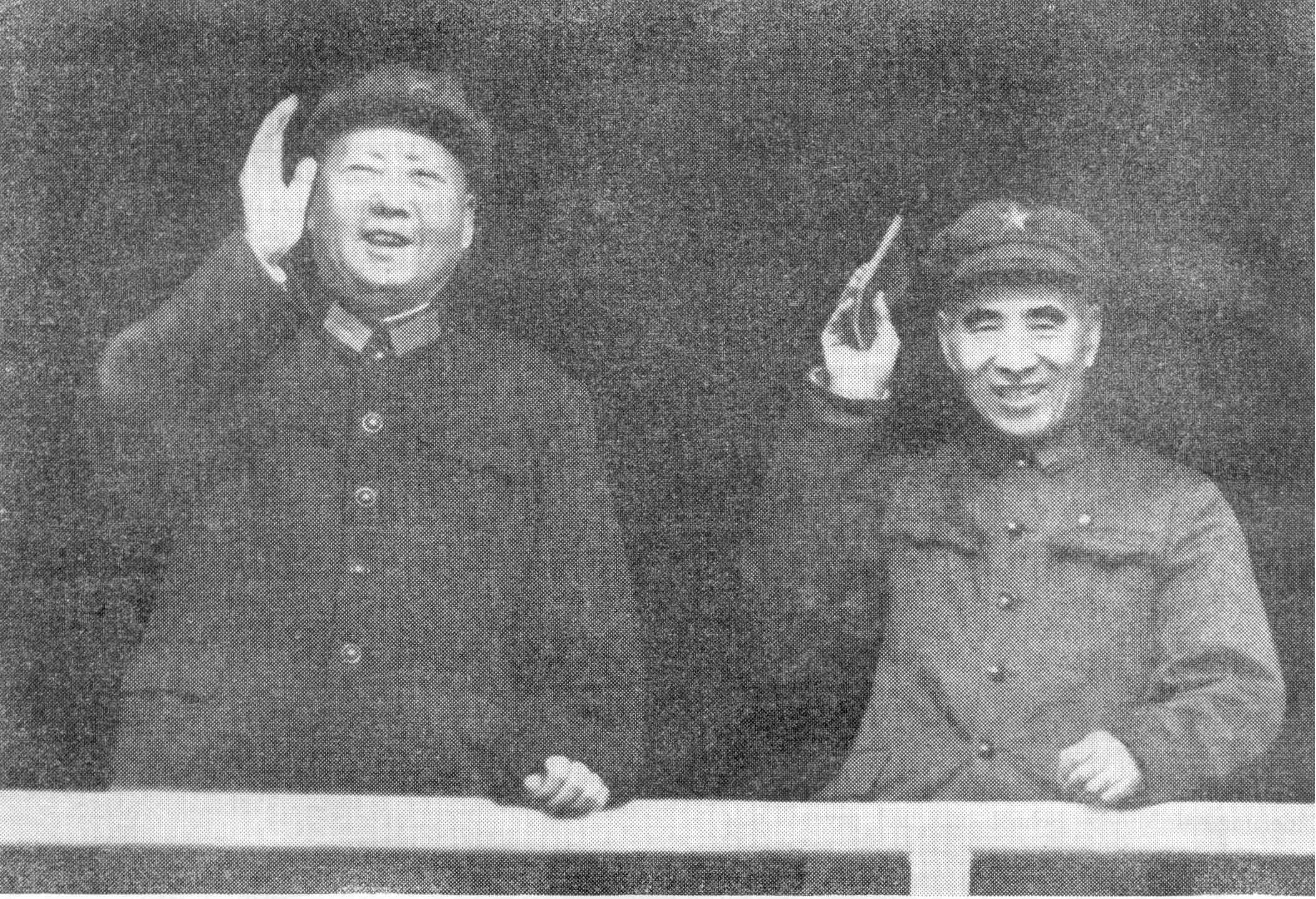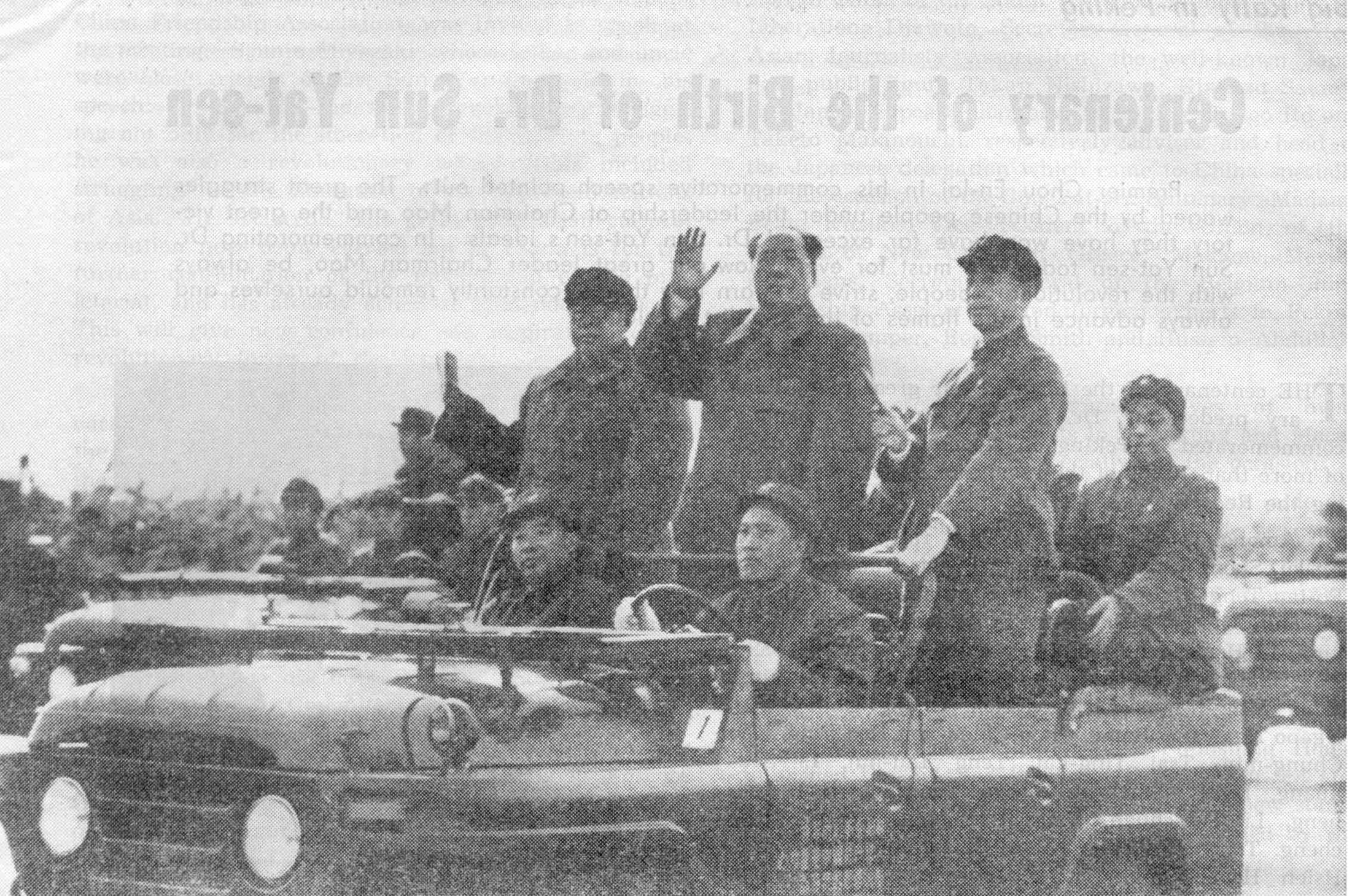
Chairman Mao and his close comrade-in-arms Comrade Lin
Piao reviewing the mighty army of the cultural revolution
Chairman Mao Reviews Mighty Cultural
Revolutionary Contingents for the 7th Time
[This article is reprinted from Peking Review, Vol. 9, #47, Nov. 18,
1966, pp. 5-7. Thanks are due to the WWW.WENGEWANG.ORG
web site for some of the work done for this posting.]
Chairman Mao said cordially to some leading comrades: “You should put politics in command, go to the masses and be one with them and carry on the great proletarian cultural revolution even better.”
The young revolutionary fighters enthusiastically cheered: “Long live Chairman Mao!” and Chairman Mao replied: “Comrades, long life to you!”
CHAIRMAN MAO, our most respected and beloved great leader and the greatest proletarian revolutionary, on November 10 and 11 received and reviewed more than 2 million revolutionary students and teachers and Red Guards from all parts of the country. It was the seventh time since August 18 that he had done so.
On November 10, Chairman Mao and his close comrade-in-arms Comrade Lin Piao, wearing military uniforms and in high spirits, reviewed 600,000 revolutionary students and teachers and Red Guards, part of whom passed through the Tien An Men Square on 6,000 lorries while the remainder were assembled on the square itself. The review lasted more than six hours. The young fighters kept on cheering “Long live Chairman Mao! A long, long life to him!” Chairman Mao waved to the cheering crowds from time to time and walked to the microphone to cheer loudly: “Comrades, long life to you!”
To some of the leading comrades on the rostrum, Chairman Mao said cordially: “You should put politics in command, go to the masses and be one with them and carry on the great proletarian cultural revolution even better.”
At precisely 10 a.m.. Chairman Mao, together with Comrade Lin Piao, his close comrade-in-arms, mounted the Tien An Men rostrum to the music of The East Is Red which was played by a military band. They were followed by leading comrades of the Party Central Committee and from other fields — Chou En-lai, Tao Chu, Chen Po-ta, Teng Hsiao-ping, Liu Shao-chi, Chu Teh, Li Fu-chun, Soong Ching Ling, Chen Yi, Ho Lung, Tan Chen-lin, Hsu Hsiang-chien, Yeh Chien-ying, Li Hsueh-feng, Hsieh Fu-chih, Liu Ning-I, Hsiao Hua, Yang Cheng-wu, Liu Chih-chien, Chang Chun-chiao and Wu Teh. Comrade Chen Po-ta, Member of ihe Standing Committee of the Political Bureau of the Central Committee of the Chinese Communist Party and leader of the cultural revolution group under the Party’s Central Committee, declared the rally open and the review began.
To the strains of Sailing the Seas Depends on the Helmsman, lorries carrying young fighters slowly drove five abreast through Tien An Men Square which was a joyous ocean of red. Each lorry carried in front a coloured portrait of Chairman Mao, and was decorated with streamers inscribed with slogans. The columns of vehicles extended over 15 kilometres.
Among those on the lorries were several thousand revolutionary students and teachers and Red Guards from the various nationalities of Sinkiang. Before they came to Peking, students and teachers of the Urumchi Experimental Middle School had had several discussions and decided that the pines growing on the Tien-shan Mountains, which remain green in the bitterest cold or scorching heat, could best express the great love the people of Sinkiang’s various nationalities have for Chairman Mao. Four representatives walked many kilometres to the Tienshan Mountains to dig up two of the finest trees to be taken to Peking. Two red placards were tied to these pines, expressing the innermost feelings of their senders: “We present these to the great, glorious and correct Communist Party of China!” “May our great leader Chairman Mao live a long, long life like the pines on the Tienshan Mountains!”
The Chinese students, glorious anti-revisionist fighters who were unjustifiably ordered to return home by the Soviet Government not long ago, were all present at the reviewing stand to the east of the rostrum. They said that seeing Chairman Mao, the reddest red sun in their hearts, filled them with boundless happiness and the greatest warmth. Hung Kang, one of the students, said with great feeling: “Dear Chairman Mao, it was your great thought, your wise teachings that enabled us to achieve one victory after another in our struggle against Soviet modern revisionism. We will creatively study and apply your brilliant works still better, and carry the great proletarian cultural revolution and the struggle against revisionism through to the end.” Hu Teh-pao, another returned student, wrote down his pledge on the front page of his Quotations From Chairman Mao Tse-tung: “Dear Chairman Mao, I will study to grasp your great thought, follow you all my life to make revolution, and serve the Chinese people and the people of the world wholeheartedly.”
When Chairman Mao walked to the east and west ends of the rostrum, revolutionary young fighters both on and below the reviewing stands cheered with great joy: “Long live Chairman Mao!” “Long live the victory of Chairman Mao’s revolutionary line!” They said: Chairman Mao understands and supports us best of all and lights a beacon to guide us when we need it. When we met with difficulties in struggle, we thought only of Chairman Mao. With Mao Tse-tung’s thought, we fear neither heaven nor earth, still less ghosts and monsters. We are determined to make still better use of extensive democracy, this sharpest revolutionary weapon, to criticize and repudiate thoroughly the bourgeois reactionary line, eradicate the poison it has spread, and carry the great proletarian cultural revolution through to the end.
At three o’clock in the afternoon, when the lorries had passed, the young revolutionary fighters gathered on the square surged towards the rostrum. With all their hearts, they shouted “A long, long life to Chairman Mao!” When Chairman Mao waved his cap again and again to the crowds on the reviewing stands and on the square, the joy of the entire gathering was unrestrained. Everyone jumped and danced in happiness and the air was filled with resounding cheers.
On the following day, our most respected and beloved great leader Chairman Mao continued with the review of the mighty contingents of the cultural revolution.
At 2:30 in the afternoon, to the strains of The East Is Red, Chairman Mao and other Party leaders drove slowly in open cars along the 13-kilometre thoroughfare which runs through Tien An Men Square. People excitedly looked up at Chairman Mao, waving copies of Quotations From Chairman Mao Tse-tung, cheering and leaping for joy.
Standing in his car, Chairman Mao kept waving greetings to the cheering crowd. The fact that he was full of energy and very happy when he received and reviewed the mighty army of the cultural revolution for two days in a row tremendously inspired the young revolutionary fighters.
As Chairman Mao’s car drove slowly past hundreds of revolutionary students and teachers of minority nationalities, including Mongolians, Uighurs, Tibetans, Koreans and Kazakhs, the young fighters shouted in different languages: “Long live Chairman Mao!” “Long life, long life to Chairman Mao!” As soon as Chairman Mao’s car drove past, young people of many nationalities surged to the middle of the avenue and sang and danced in the greatest happiness. Young Mongolian fighters sang: “People said that nothing is as bright as the sun in the sky, but it is not as bright as the brilliance of Mao Tse-tung’s thought. Oh, Chairman Mao, people of all nationalities love you ardently; you are the red sun in our hearts!”

Chairman Mao waves to the revolutionary students and
teachers and Red Guards from various parts of the country
When the more than 1,000 young revolutionary fighters from the Liuyang area in Hunan Province, where Chairman Mao staged the Autumn Harvest Uprising more than 30 years ago, saw Chairman Mao, they excitedly declared that they would certainly learn from our great leader, go deep among the masses, come face to face with reality and, in the great storms and waves of the revolution, steel themselves into staunch successors to the proletarian revolutionary cause.
Among those reviewed were many Red Guard long march groups which had come to Peking on foot from Inner Mongolia, Hopei, Shantung and Shansi. They had walked out of the small classrooms of their schools into the big classrooms of society and taken the worker and peasant masses for their teachers. They were enormously elated when they saw on their way moving scenes showing how Mao Tse-tung’s thought was penetrating deep into people’s hearts. The long march group of ten Red Guards of the No. 16 Middle School in Tsinan, Shantung Province, passed through 14 counties and cities. They visited poor peasants and asked old poor peasants and veteran cadres to tell their family and village histories. They said: “We get the most vivid and profound education by asking these people who have themselves endured all the hardships of the old society to give us lessons in the class struggle.” They added that Chairman Mao had shown the deepest concern for them by supporting their travelling through the country on foot to exchange revolutionary experience, that they would certainly steel themselves in great storms and waves, foster the communist world outlook of wholehearted dedication to the public interest and be Chairman Mao’s good students.
As on the previous occasions, the good news that Chairman Mao had received and reviewed the mighty army of the cultural revolution for the seventh time spread throughout the country and gave rise to great rejoicing. The revolutionary masses and commanders and fighters of the People’s Liberation Army enthusiastically held meetings and forums and staged performances to celebrate the great victory for the proletarian revolutionary line represented by Chairman Mao and hail the excellent situation in the great cultural revolution and in production and construction. They pledged to follow Chairman Mao closely, carry out and defend the proletarian revolutionary line resolutely, criticize and repudiate the bourgeois reactionary line thoroughly, and carry on the great proletarian cultural revolution even better.
Contents page for this Peking Review issue.
Peking Review article list (in date order).
Peking Review article list (by subject).